Nonsense, Language, and the Balkans
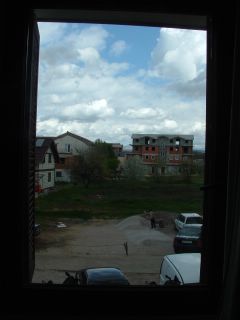
The view from our window in Bosnia
There is no such thing as an isolated humanist
-Edward Said
Jazz is something Negroes invented, and it said the most profound things -- not only about us and the way we look at things, but about what modern democratic life is really about. It is the nobility of the race put into sound ... jazz has all the elements, from the spare and penetrating to the complex and enveloping. It is the hardest music to play that I know of, and it is the highest rendition of individual emotion in the history of Western music.
-Wynton Marsalis

The wine the morning after, leaving the ferry
Sitting at a long table full of friends at Los Bravos, my friend Will Cathcart and I were telling a story about spending Easter in
Ironically, in this case, that meant we were keeping close to the plan. Will and I had made a vow to each other that we wouldn’t plan too much in advance, and we’d just sort of go with the flow. Thusly, the fact that we were on our way to Ancona―a city about a hundred or so miles north of our intended destination, Bari―was something to be admired. I have to say, we were doing a pretty bang-up job―it was day one, we were already several hours late and several hundred miles off course, which meant we were going to land in Croatia several hundred miles north of our target in Dubrovnik. We had to hitchhike to the ferry after walking for half an hour on the highway, and we ended up running to the door of the ferry as it was closing.
That night, on the ferry, we met four Italian ladies who spoke no English and a little French, yet—in normal Italian fashion—they talked to us anyway as if we were Italians and invited us to come with them to a small town in
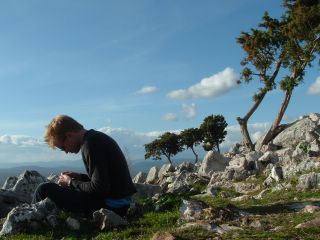
Will on Mt. Crznika
For the next three days, our little adventure took two awkward Protestant kids, Will and I, to a Catholic holy site in a foreign country that we had heard of only on the nightly news when we were children. We did a lot of wandering, visited the town music shop filled only with pirated DVDs and CDs, climbed the famous Mount Crnica―where the apparitions are said to have occurred―and sat up there for several hours looking out across Bosnia.
Will bought a phone card and called his dad for the fun of it:
“Hey. Dad? Hey. Yeah, it’s me. Will! Can you hear me? Hey, we’re in
Then it was my turn, and Will―trying to maintain some sense of normality―even managed to incense his ever growing hatred for inanimate objects after an unpleasant run-in with a post-office computer that didn’t end happily. His outburst took place as I was sending a one-line email to my family saying,
Hey, Mom and Dad, we ended up in
Love, Robo
.
Now, nearly a year later, back at Los Bravos in Clemson, Will and I were recounting the less-than-serious conversation we had on the way down from Mt. Crnica that involved us getting caught up in an elaborate CIA plot to assassinate Slobodan Milosevic before his trial which was just getting started.
When we finished the story, a friend said jokingly that we would make good CIA agents, because no one would expect it. After I said that I wouldn’t be to keen on being a CIA agent, she responded, “Yeah, me neither, I could never do something so unpatriotic. We should all be faithful to our country.” I didn’t ponder for a second the peculiarity of that particular comment; I don’t think I even skipped a beat.
“I don’t believe in countries or borders. They’re not real,” I said, taking in a deep breath right afterwards, as though I was trying to suck the whole comment out of the air before they heard it. If I had learned anything from the news or books on “Anti-Americanism,” it was that to say you didn’t agree with or believe in something meant you aligned with the opposite side or that you were totally against whatever it was that you didn’t believe in.
I’m just going to jump right to the point: I believe that the only differences that exist are the ones we create, and this is why I don’t believe in place. Not only that, but I think in some cases a belief in place, or its significance, can be dangerous.
This, I’ve found, is a very controversial idea to have, being an English major. For the last forty years or so, there has developed a series of theories based on the idea of something called Déconstruction, a term attributed to a French philosopher Jacques Derrida, who died just last year. For decades, Derrida had the uncoveted position of being simultaneously the most hated and respected thinker of his generation. He is esteemed for his ideas that revolutionized literary theory, political theory, cultural theory, and, well, just about any other type of theory.
Yet, there is a considerable contingent of people who don’t so much like M. Derrida. Here’s a pretty standard explanation from those who oppose the “intellectual fad”:
“Deconstruction…has run through the humanities departments of American universities like a virus through a computer network. It has turned most intellectual questions into the equivalent of Lenin’s Who Whom?...Truth is nothing, only power counts.” (Hollander 70)
This section on Derrida in Anthony Daniels’ essay “Superiority and Inferiority in French Anti-Americanism” in Understanding Anti-Americanism is concluded with a foreboding hypothetical: “The time may yet come when an historian may argue that deconstruction was
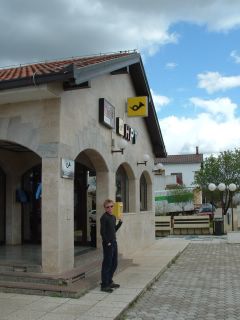
The Den of evil....
So, now that it’s been properly introduced, I should define it, but, unfortunately, the essence of Deconstruction is that there can be no definition―now, do you see why people hate it?―but I can present some of the reasoning behind it:
· Establishing a system of differences is necessary to have understanding.
· Language is no more than a system of differences, which means a saxaphone is what it is because of what makes it different from everything else.
· The context in which language is used is where its definition comes from, but the context can never be fully defined, thusly, the words can’t be fully defined.
· After the system of differences is established, one has to be re-educated, in a sense, to recognize that the comparisons that have been created are now the instrument to be “played.”
Take for instance what is considered to be the first authentic art-form born in the most diverse nation in the world, jazz, and think of it as language. As Wynton Marsalis said in Ken Burn’s documentary Jazz, it allows musicians to “speak to each other in the language of music.” He couldn’t be more correct. Jazz is simply deconstruction put to music. It’s often considered the hardest music to play, and most people think it’s because the structure is so complex. As a musician, however, I see jazz simply as taking those structures and saying, “Don’t worry too much about those,” which, in turn, is perhaps the most complex of structures.
Now, that said, considering the ideology of deconstruction, it’s not really a new concept. One can go back to Kant or Locke and find many of this same sort of thought in their writing. Furthermore, we so often look back in history to certain geniuses―Da Vinci,
It is this idea in broad truth that leads me to believe what I said once in class when trying to explain my idea of difference, or the lack thereof. It’s not that I don’t recognize that culture will influence the actions of a person, rather it’s that I see those cultures as a response to the exact same things that created my culture—and that’s not a Freudian survival idea, it’s more of what Edward Said argued in Orientalism. To look at it in that way doesn’t ruin objectivity or create relativism. All it does is shift the focus from the what of culture to the why.
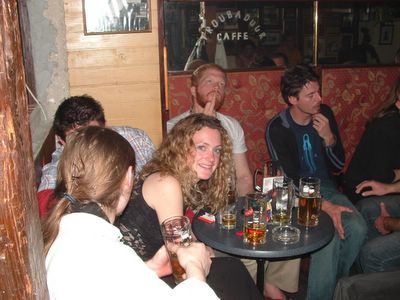
Some time with the Troubadours
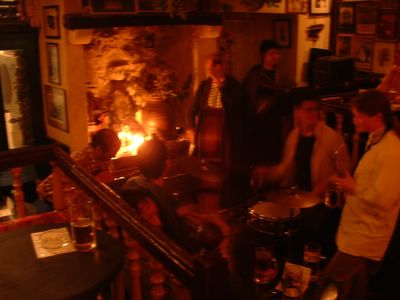
That is why I travel. I like to see the way people in different regions of the world react to life. How do they represent the feelings and ideals we all have? How do they explain the past? What symbols or expression do they use? Not, what is there in that place? The latter question is my reason for bringing up our trip to
Both Arlin and Tim—Irish and South African, respectively―looked at me uneasily. We were in a jazz bar called the Troubadour in a place that was torn apart less than ten years ago by overt and violent nationalism. Arlin cleared her throat, and said, “Robert, you better be careful. Patriotism is damn dangerous thing. Look at what it did to my country.” Tim sat next to her nodding. It had never crossed my mind to look at it that way, but there is an implicit “us” verses “them” idea in patriotism. I mean it did take the attacks to pull “us” together.
Even if it is not a battle, it is always “us” and “them.” In war, people say, “We did this or that,” whether or not that person was a part of it. Furthermore, when I tell people I think patriotism is dangerous, they, more often than not, scoff at me for being an

Pan of Dubrovnik, Croatia
We need to stop looking for what defines us and realize that everything we cite in differentiating ourselves is actually what makes us similar. Language is not tantamount to communication. Par exemple, si je dirais quelque chose en français, vous, peut-être, ne comprendriez pas, mais, quand même, ça ne vous dire pas que je n’ai rien expliquer. That’s why I think that jazz had the unifying effect that it did. People came together and created something that transcended words, and the result was something that broke barriers.
For fear that I would seem naïve or that I am making mountains out of mole-hills, I had wanted so badly to show ancient art and music from different areas, present a history of the development definition in the 18th century, show the effects that physics and chemistry had on literature, and explain place in religion, showing the problems it presents. I want to discuss the similarities between the chi in Taoism and the Holy Spirit in Christianity. However, I think I may have to accept the fact that words alone will never be able to explain how one perceives the world, and I can only hope that one day, if I’m right, I can find a way to express it.
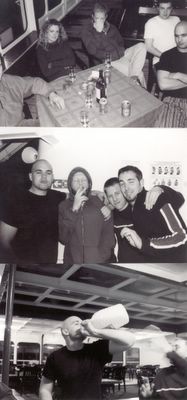




2 Comments:
My Fellow redhead...
First, you rock for getting back to me, second, sorry for taking so long to get back to you.
I was thinking about this yesterday. Take the "Fanfan" issue. I was thinking about how everything that happened in our lives--the smallest things--led us to meet when we did. I'm not talking about any devine inspiration, though I'm not ruling it out---all depends on what one believes.
But, honestly, even a night that I came home late for curfew in high school or breaking my arm in third grade, could have led me to meeting her in France when I did, and it's the same from her side.
Taking it further, there's a theory about how a butterfly flapping its wings one side of the world can cause a famine on the other. It's all connected (I'm sure Dr. Morrissey knows what I'm thinking about).
Have you ever seen "Amelie"? It's one of my favorite movies ever. The very beginning, and the very end are lists of seemingly unrelated things, and I think the point is the same, that it's all connected.
Oh, and I Heart Huckabees is one of THE greatest movies of all time. HOWEVER, I had a real problem making the stretch to equate the main character's life to Stephen's life (by the way, I think Stephen is supposed to be a reference to the "Lost Boys," have you ever heard of them...I believe there is a documentary about them). The connection I would like to make between the two, is that Stephen's problem could have been helped if the main character's problem hadn't existed. Does that make sense? That's to say, that if the main character, and millions of middle class americans like himself, hadn't been disposessed in the way that the movie was trying to say that they were, then they could have focused on real problems like the civil war in Sudan, not just psychological family issues.
Oh, and I meant to say this too. One of the most important lessons I've learned from travelling and studying another language, is this: Language is much more a movement than a sound.
That's in reference to what you said about sign language.
Look at the last poem in Semantics. You'll see.
Post a Comment
<< Home